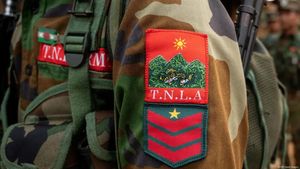Poland has officially announced the reactivation of its embassy in North Korea, making it the second Western country to reopen operations following the prolonged hiatus caused by stringent COVID-19 restrictions established by Pyongyang. The Polish Foreign Ministry confirmed this significant diplomatic development, indicating the reopening is aimed at restoring communication channels between Poland, a NATO member, and North Korea, which maintains strong ties with Russia.
This diplomatic move follows Sweden's lead; Sweden is the first Western nation to resume its diplomatic activities with North Korea when it reopened its embassy back in September. Poland’s embassy had been closed since December 2020, coinciding with North Korea's complete border closure due to the pandemic, rendering consistent diplomatic engagement impossible.
Polish officials recently traveled to Pyongyang to facilitate this initiative, as the ministry described the delegation’s visit as both technical and political. The main objective of the visit was to reinstate Poland’s permanent diplomatic mission within North Korean territory. This marked Poland's efforts to navigate the increasingly complex geopolitical environment surrounding its eastern neighbor, especially as tensions related to the war in Ukraine continue to evolve.
The reopening of the Polish embassy provides not just Poland, but also NATO and the European Union, with enhanced options to engage, monitor, and potentially mitigate North Korea's support for Russia amid the latter's military operations against Ukraine. Reports suggest significant involvement from North Korea, including sending troops to support Russia. U.S. intelligence estimates suggest nearly 12,000 North Korean troops have been deployed to the Russian border region, aimed at assisting with combat operations against Ukrainian forces.
The broader implications of Poland re-establishing its embassy raise questions about the slowly shifting geopolitical alliances and how they might influence the dynamics of international relations. NATO, along with the EU, has ramped up efforts to persuade China and other allies to intervene diplomatically with North Korea, primarily to deter Pyongyang from bolstering Russia’s military capabilities against Ukraine.
Importantly, both Poland and Sweden are now positioned to represent other countries lacking formal diplomatic relations with North Korea. Sweden has taken the initiative to represent the interests of other nations at its embassy as well, potentially becoming pivotal players amid the shifting diplomatic terrains.
While the reopening of embassies symbolizes renewed dialogue, it also adds layers to the complicated narrative of international diplomacy with North Korea, particularly concerning its military ambitions and relationships with Russia. Analysts will be watching closely how Poland's actions, followed by Sweden's earlier moves, influence the geopolitical chessboard, especially with Putin’s regime and its reliance on North Korea.
Reestablishing diplomatic ties presents not only opportunities for dialogue but also developments to monitor, as the interactions between these countries could allow for peace talks or, conversely, exacerbate existing tensions if matters escalate.
Moving forward, as global diplomatic engagement with North Korea resumes, it remains to be seen what collaborative international actions can be gleaned from these recent diplomatic efforts and how both nations intend to navigate this complex web of political, military, and humanitarian issues. Poland's renewed presence is emblematic of Western efforts to rekindle conversations with states often viewed as isolated, entwined within broader strategies to stabilize upcoming global security concerns.



